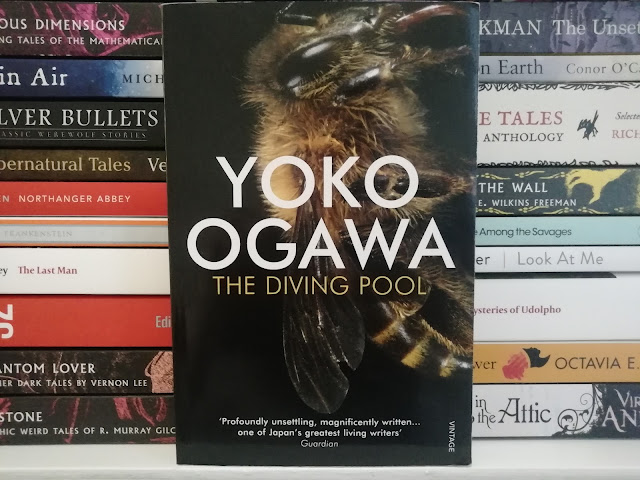This collection of three novellas by Japanese author Yōko Ogawa is a deeply unsettling and atmospheric work. As subtle as it is quietly powerful, Ogawa’s brand of psychological horror explores the ‘horrific femininities’ of daily life, conjured by a gentle, sparse prose frequently serrated by striking, disturbing imagery. 'The Diving Pool' tells of a lonely teenage girl who falls in love with her foster-brother as she watches him leap from a high diving board into a pool - sparking an unspoken infatuation that draws out darker tendencies. 'Pregnancy Diary' follows a young woman who records the daily moods of her pregnant sister in a diary, but rather than a story of growth the diary reveals a more sinister tale of greed and repulsion. The final story, 'Dormitory', involves a woman who visits her old college dormitory on the outskirts of Tokyo, where she finds an isolated world shadowed by decay, haunted by absent students and the figure of a lonely caretaker.
Ogawa’s narrators are young, alienated women, who feel trapped by the ideals of conventional society. Echoes of Shirley Jackson resonate throughout as each character finds herself hopelessly imprisoned by society’s expectations; the domestic settings a veritable cage, personal desires never attained. While loneliness and alienation are constant themes, Ogawa stops short of revealing the inner workings of her characters. This leaves a troubling sense of inconclusion which lingers throughout. Their motivations are elided. There’s a sense of quiet and eerie peacefulness in each of the tales, which serves to heighten tension and completely disarm the reader.
Throughout, Ogawa conjures vivid, quietly powerful imagery – the snow-covered hallway (The Diving Pool), the grapefruits strewn about a stark kitchen (Pregnancy Diary), and the swarms of bees buzzing throughout a shadowy building (Dormitory). Imagery of food, especially sweet foods like cakes, desserts, and jams, reoccurs, as do acts of eating and feeding, the connotations of which – caring, comfort, sustenance - eventually turn sinister (the spoiled treat fed to the little girl in The Diving Pool, the jams made from grapefruits riddled with pesticides (Pregnancy Diary) and the cakes shared by the narrator and the caretaker in the final story. The implications of various actions are shocking and not easily forgotten, nor are the snatches of cruelty and undercurrent of tragedy.
Recommended for those who like their horror subtle and whispery.
